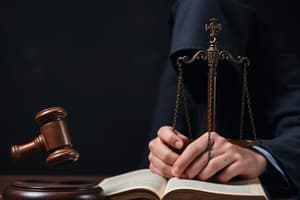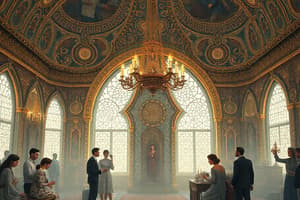Podcast
Questions and Answers
What is a key characteristic of crime?
What is a key characteristic of crime?
- It is a social construct with a varying definition based on context. (correct)
- It is an inherent and objective concept with a universal standard.
- It is a legal concept with a fixed set of rules and regulations.
- It is a universally accepted concept with a fixed definition.
Who or what defines crime?
Who or what defines crime?
- Only religion and morality.
- Only social norms and values.
- Only the state and government.
- A combination of social norms, values, religion, state, and power relations. (correct)
What is a key difference between deviance and crime?
What is a key difference between deviance and crime?
- Deviance is always informal, while crime is always formal.
- Deviance is not always illegal, while crime is always illegal. (correct)
- Deviance is always formal, while crime is always informal.
- Deviance is always illegal, while crime is always legal.
What happens when deviance is repeated or committed by people in power?
What happens when deviance is repeated or committed by people in power?
Who can punish offenders?
Who can punish offenders?
What is crime a product of?
What is crime a product of?
What is a common outcome when an act of deviance is repeated or committed by people in power?
What is a common outcome when an act of deviance is repeated or committed by people in power?
Why are some ordinary behaviors considered criminal in certain contexts?
Why are some ordinary behaviors considered criminal in certain contexts?
What is a key similarity between crime and deviance?
What is a key similarity between crime and deviance?
What is the role of power relations in defining crime?
What is the role of power relations in defining crime?
What is an example of an informal rule that is not officially defined by criminal law?
What is an example of an informal rule that is not officially defined by criminal law?
What is the relationship between crime and social norms?
What is the relationship between crime and social norms?
What is the outcome when new laws are created, and police powers are expanded?
What is the outcome when new laws are created, and police powers are expanded?
Who, apart from the criminal justice system, can punish offenders?
Who, apart from the criminal justice system, can punish offenders?
Flashcards are hidden until you start studying
Study Notes
Definition of Crime
- Crime is a social construct, and its definition varies based on context, changing over time and space
- There is no universal or inherent criminal or deviant act, only acts defined as such by law and state with attached sanctions
Who Defines Crime
- Social norms and values (e.g., ağsaqqal, patriarchy)
- Religion
- State/government
- Power relations (e.g., rich people, influential figures)
Normalized Deviance
- Repeated deviance can become normal over time (e.g., exceeding speed limits)
Similarities between Crime and Deviance
- Both deviate from socially accepted norms
- Harm others' rights
- Socially constructed and context-dependent
Differences between Crime and Deviance
- Deviance doesn't necessarily violate laws
- Informal rules and norms govern deviance, rather than written laws
- Example: standing in a queue is governed by informal etiquette, not criminal laws
Impact of Legislation on Crime
- Changes in legislation can criminalize ordinary behaviors (e.g., traveling, not wearing a mask, working outdoors)
- Police powers can be expanded
Punishment of Offenders
- Criminal justice system (police, prosecutors, courts, prisons, etc.)
- Citizens, including students, can also contribute to punishing offenders
Crime as a Social Product
- Crime is the result of social forces and relations
Definition of Crime
- Crime is a social construct, and its definition varies based on context, changing over time and space
- There is no universal or inherent criminal or deviant act, only acts defined as such by law and state with attached sanctions
Who Defines Crime
- Social norms and values (e.g., ağsaqqal, patriarchy)
- Religion
- State/government
- Power relations (e.g., rich people, influential figures)
Normalized Deviance
- Repeated deviance can become normal over time (e.g., exceeding speed limits)
Similarities between Crime and Deviance
- Both deviate from socially accepted norms
- Harm others' rights
- Socially constructed and context-dependent
Differences between Crime and Deviance
- Deviance doesn't necessarily violate laws
- Informal rules and norms govern deviance, rather than written laws
- Example: standing in a queue is governed by informal etiquette, not criminal laws
Impact of Legislation on Crime
- Changes in legislation can criminalize ordinary behaviors (e.g., traveling, not wearing a mask, working outdoors)
- Police powers can be expanded
Punishment of Offenders
- Criminal justice system (police, prosecutors, courts, prisons, etc.)
- Citizens, including students, can also contribute to punishing offenders
Crime as a Social Product
- Crime is the result of social forces and relations
Studying That Suits You
Use AI to generate personalized quizzes and flashcards to suit your learning preferences.




